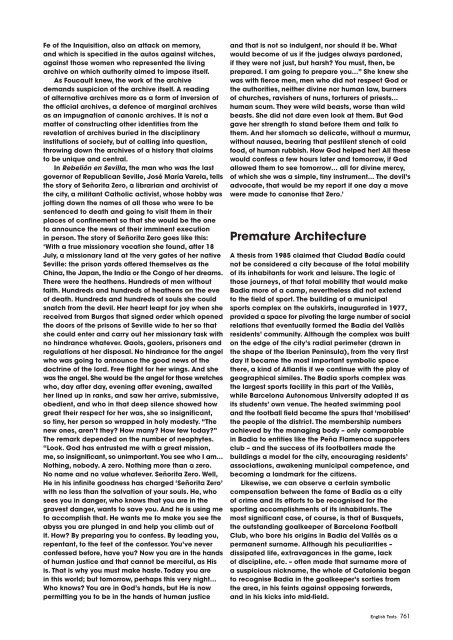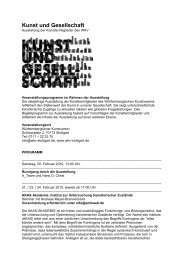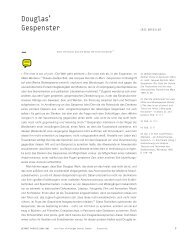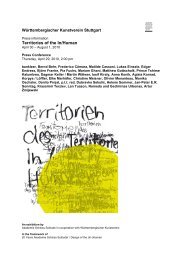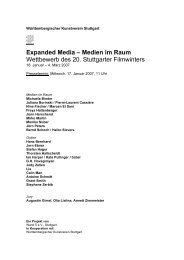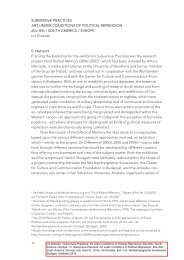English Texts
English Texts
English Texts
You also want an ePaper? Increase the reach of your titles
YUMPU automatically turns print PDFs into web optimized ePapers that Google loves.
Fe of the Inquisition, also an attack on memory,<br />
and which is specified in the autos against witches,<br />
against those women who represented the living<br />
archive on which authority aimed to impose itself.<br />
As Foucault knew, the work of the archive<br />
demands suspicion of the archive itself. A reading<br />
of alternative archives more as a form of inversion of<br />
the official archives, a defence of marginal archives<br />
as an impugnation of canonic archives. It is not a<br />
matter of constructing other identities from the<br />
revelation of archives buried in the disciplinary<br />
institutions of society, but of calling into question,<br />
throwing down the archives of a history that claims<br />
to be unique and central.<br />
In Rebelión en Sevilla, the man who was the last<br />
governor of Republican Seville, José María Varela, tells<br />
the story of Señorita Zero, a librarian and archivist of<br />
the city, a militant Catholic activist, whose hobby was<br />
jotting down the names of all those who were to be<br />
sentenced to death and going to visit them in their<br />
places of confinement so that she would be the one<br />
to announce the news of their imminent execution<br />
in person. The story of Señorita Zero goes like this:<br />
‘With a true missionary vocation she found, after 18<br />
July, a missionary land at the very gates of her native<br />
Seville: the prison yards offered themselves as the<br />
China, the Japan, the India or the Congo of her dreams.<br />
There were the heathens. Hundreds of men without<br />
faith. Hundreds and hundreds of heathens on the eve<br />
of death. Hundreds and hundreds of souls she could<br />
snatch from the devil. Her heart leapt for joy when she<br />
received from Burgos that signed order which opened<br />
the doors of the prisons of Seville wide to her so that<br />
she could enter and carry out her missionary task with<br />
no hindrance whatever. Gaols, gaolers, prisoners and<br />
regulations at her disposal. No hindrance for the angel<br />
who was going to announce the good news of the<br />
doctrine of the lord. Free flight for her wings. And she<br />
was the angel. She would be the angel for those wretches<br />
who, day after day, evening after evening, awaited<br />
her lined up in ranks, and saw her arrive, submissive,<br />
obedient, and who in that deep silence showed how<br />
great their respect for her was, she so insignificant,<br />
so tiny, her person so wrapped in holy modesty. “The<br />
new ones, aren’t they? How many? How few today?”<br />
The remark depended on the number of neophytes.<br />
“Look. God has entrusted me with a great mission,<br />
me, so insignificant, so unimportant. You see who I am…<br />
Nothing, nobody. A zero. Nothing more than a zero.<br />
No name and no value whatever. Señorita Zero. Well,<br />
He in his infinite goodness has charged ‘Señorita Zero’<br />
with no less than the salvation of your souls. He, who<br />
sees you in danger, who knows that you are in the<br />
gravest danger, wants to save you. And he is using me<br />
to accomplish that. He wants me to make you see the<br />
abyss you are plunged in and help you climb out of<br />
it. How? By preparing you to confess. By leading you,<br />
repentant, to the feet of the confessor. You’ve never<br />
confessed before, have you? Now you are in the hands<br />
of human justice and that cannot be merciful, as His<br />
is. That is why you must make haste. Today you are<br />
in this world; but tomorrow, perhaps this very night…<br />
Who knows? You are in God’s hands, but He is now<br />
permitting you to be in the hands of human justice<br />
and that is not so indulgent, nor should it be. What<br />
would become of us if the judges always pardoned,<br />
if they were not just, but harsh? You must, then, be<br />
prepared. I am going to prepare you…” She knew she<br />
was with fierce men, men who did not respect God or<br />
the authorities, neither divine nor human law, burners<br />
of churches, ravishers of nuns, torturers of priests…<br />
human scum. They were wild beasts, worse than wild<br />
beasts. She did not dare even look at them. But God<br />
gave her strength to stand before them and talk to<br />
them. And her stomach so delicate, without a murmur,<br />
without nausea, bearing that pestilent stench of cold<br />
food, of human rubbish. How God helped her! All these<br />
would confess a few hours later and tomorrow, if God<br />
allowed them to see tomorrow… all for divine mercy,<br />
of which she was a simple, tiny instrument… The devil’s<br />
advocate, that would be my report if one day a move<br />
were made to canonise that Zero.’<br />
Premature Architecture<br />
A thesis from 1985 claimed that Ciudad Badía could<br />
not be considered a city because of the total mobility<br />
of its inhabitants for work and leisure. The logic of<br />
those journeys, of that total mobility that would make<br />
Badia more of a camp, nevertheless did not extend<br />
to the field of sport. The building of a municipal<br />
sports complex on the outskirts, inaugurated in 1977,<br />
provided a space for pivoting the large number of social<br />
relations that eventually formed the Badia del Vallès<br />
residents’ community. Although the complex was built<br />
on the edge of the city’s radial perimeter (drawn in<br />
the shape of the Iberian Peninsula), from the very first<br />
day it became the most important symbolic space<br />
there, a kind of Atlantis if we continue with the play of<br />
geographical similes. The Badia sports complex was<br />
the largest sports facility in this part of the Vallès,<br />
while Barcelona Autonomous University adopted it as<br />
its students’ own venue. The heated swimming pool<br />
and the football field became the spurs that ‘mobilised’<br />
the people of the district. The membership numbers<br />
achieved by the managing body – only comparable<br />
in Badia to entities like the Peña Flamenca supporters<br />
club – and the success of its footballers made the<br />
buildings a model for the city, encouraging residents’<br />
associations, awakening municipal competence, and<br />
becoming a landmark for the citizens.<br />
Likewise, we can observe a certain symbolic<br />
compensation between the fame of Badia as a city<br />
of crime and its efforts to be recognised for the<br />
sporting accomplishments of its inhabitants. The<br />
most significant case, of course, is that of Busquets,<br />
the outstanding goalkeeper of Barcelona Football<br />
Club, who bore his origins in Badia del Vallès as a<br />
permanent surname. Although his peculiarities –<br />
dissipated life, extravagances in the game, lack<br />
of discipline, etc. – often made that surname more of<br />
a suspicious nickname, the whole of Catalonia began<br />
to recognise Badia in the goalkeeper’s sorties from<br />
the area, in his feints against opposing forwards,<br />
and in his kicks into mid-field.<br />
<strong>English</strong> <strong>Texts</strong> 761


